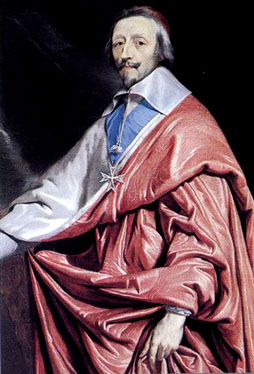The Peace of Westphalia, 1648. The Thirty Years’ War is over and the great wars of religion have come to an end, at least in the traditional way. Wars and controversy over religion have not ended to this day, but the majority of the “hot” war days concerning religion were at an end. A new leader among European continental nations had sprung up and her name was France. By the skillful manipulation and war making effort of Jean Armand du Plessis, Cardinal Richelieu as we know him, not only was the process of consolidating the French crown into the hands of the monarchy completed, but France emerged from the Thirty Years’ War as the power in the West. The phrase, “when France sneezes the rest of Europe catches cold” was to soon be the norm throughout continental Europe as well. French philologists were to standardize the French language, allowing not only greater cooperation among the various territories in France, but also creating a language that was more “exportable” and becomes the language of the elite in Europe. It is true that Elizabeth I may have spoken French better than English in her day (r. 1558-1603), but now the language of the French would reach many ears and become truly the language of etiquette and learning, cementing further the
hold that France would maintain in Europe well after the reign of the Emperor, Napoleon I.
The peace also signaled that by design, absolutism was going to be the model way of ruling a nation. For that example, we again turn to the French and what Cardinal Richelieu had fashioned. The power of the nation was concentrated into the hands of Louis XIII by the skillful maneuvering of Richelieu. The Cardinal executed nobles who would not acquiesce to his demands of completed loyalty to the king, he confiscated their lands, and destroyed their castles. These were examples that the monarch was not to be trifled with, if one valued his life. Not the behavior that one would expect from a representative of the Church, but then again, Richelieu justified his behavior by stating, “Where the interests of the state are concerned, God absolves actions which, if privately committed, would be a crime.” This he called raison d’ etat, a perfect justification for his actions.
Of course, to be able to do all of this, Richelieu would have to subdue that traditional thorn in the side of France…the Habsburgs. This he was effectively able to do by allying with “The Lion of the North”, Gustavus Adolphus, the Protestant king of Sweden. Through this alliance until Adolphus’ death in battle (1632), Richelieu was able to effectively blunt the Habsburg dominion over French territory and rule, but actually extend the influence of France as mentioned earlier in the fourth phase of the Thirty Years’ War known as the International Phase (sometimes called the French Phase). All in all, with much more to be told about this particular year in history, 1648 can certainly stand on its own and rightfully be given the title Pivot Year.
